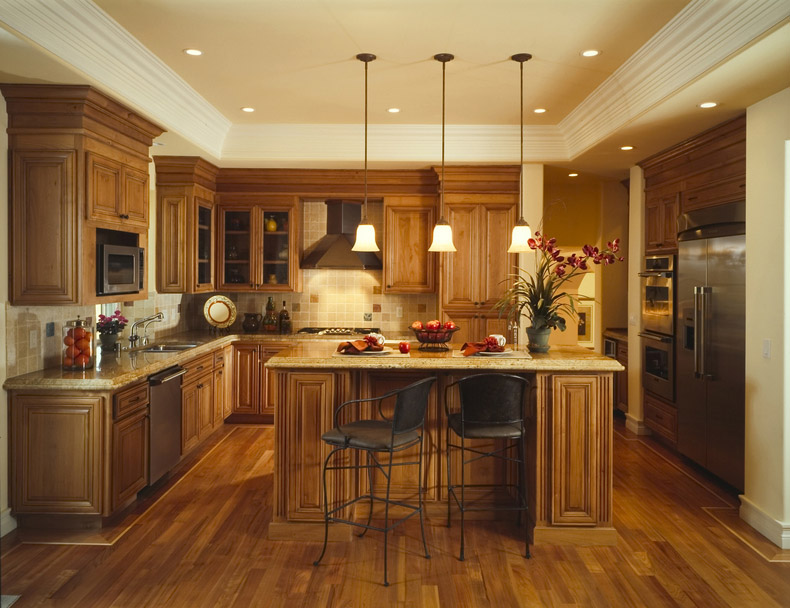Lighter Kitchens
Alright, now I know I'm probably going to take alot of flack for this because it may seem extreme. That's probably not the best way to start a blog entry but just really think about what I'm bout to say.
Kitchens should not have lights.
In todays society, the kitchen has become a gathering space for people to congregate. Everyone has a kitchen with an eat-in counter top with some bar stools, or better yet, the new thing is to put a desk in your kitchen to do bills at and such. It seems as if the purpose of the kitchen is no longer to prepare food; the kitchen is the new living room. If your kitchen didn't cost 20,000 +, it must not be a very nice kitchen, that's the ideology anyways. Lavish materials fill these new entertainment spaces such as granite; not for any functional purpose but because it looks good and the homeowner can show it off. I mean this kitchen has more wood then the library from Clue and the ceilings are higher than my entire house. So, what does this have to do with light?? Well, getting rid of lights is the solution and we've just scratched the surface of the problem.
Being that America is the most overweight country in the world, and we are desperately trying to be healthier, maybe it's time we move the entertaining out of our food filled kitchens and into, say, the living room. Why does it make sense to have a desk in the kitchen; and if you have a desk in your kitchen I KNOW you have a home office. The point is, we should not be spending so much time in the kitchen where food is surrounding us at all times. Spending large amounts of time in the kitchen can lead to bad snack forming habits.
Another bad food habit is late night snacking. With todays kitchen being showpieces, they tend to be lit up to a degree unsurmountable by any other room in the house. Therefore, we usual gravitate there in the evening. Even if you are in another room, the kitchen draws your attention, reminding you of food, maybe it's just subconscious but it's there. This leads me to the conclusion that kitchens should only be lit by natural light. Now, you're thinking, "but how are we going to see at night?" According to many reputable doctors and the website LifeScript, it is unhealthy to eat after 9pm and the later you snack the higher your risk of making poor diet choices are. By removing lights from the kitchen, we are lessening the temptation if not at least making it more difficult to indulge in late night snacking.
Now, some of you are thinking, "but sometimes I have to work late and I can't get home till late." Well, waiting till 9 to eat dinner is unhealthy in itself so you probably should take a break from work and grab a bite to eat, or pack a salad. That way, when you arrive home, you will already have eaten dinner. Also, if you have a family, making a habit of returning home after dark every night may be taking it's toll on your loved ones, so perhaps this can be a motive to arrive home on time, and have a consistent family meal time.
Now, I realize this isn't for everyone. For instance, people who live in Alaska, or a climate that has a high fluctuation of daylight hours. Or for those of you who routinely work a night shift. But this is about a lifestyle choice. Obviously everyone doesn't lead the same life or choose the same lifestyle, and that's great; it's called diversity. But for those who choose to lead a healthy, sustainable life, with a regular diet, then this might be a choice to consider.
Lightless Kitchens offer the following:
.Energy Savings
.Food Savings
.Regular Diet
.Healthy Eating Habits
The only light I would leave on in the kitchen is the fridge water dispenser light. Some people need a glass of water before bed. Also, if you are thirsty, and you see the light, you'll think water, not pop or Kool-aid. Another healthy side-effect of the lightless kitchen. As you can see, the majority of the problem is psychological and can be solved with a simple rearrangement of motivations through a simple psychological device: light.
So, kitchen should be designed to be efficient for their function and allow for great natural day light. Mies van der Rohe's Farnsworth House in Plano Illinois is a great example of a functional kitchen with great natural light. It's not a gathering place, forcing residents to gather in the places designated for relaxation and conversation.





